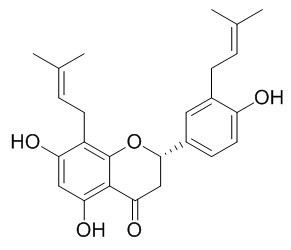Euchrestaflavanone A
Euchrestaflavanone A is an inhibitor of MRP1-like efflux activity in human erythrocytes. It reveals potent cytotoxicities against one or more cell lines with IC 50 values in the range of 4.5–9.961μM.
Inquire / Order:
manager@chemfaces.com
Technical Inquiries:
service@chemfaces.com
Tel:
+86-27-84237783
Fax:
+86-27-84254680
Address:
1 Building, No. 83, CheCheng Rd., Wuhan Economic and Technological Development Zone, Wuhan, Hubei 430056, PRC
Providing storage is as stated on the product vial and the vial is kept tightly sealed, the product can be stored for up to
24 months(2-8C).
Wherever possible, you should prepare and use solutions on the same day. However, if you need to make up stock solutions in advance, we recommend that you store the solution as aliquots in tightly sealed vials at -20C. Generally, these will be useable for up to two weeks. Before use, and prior to opening the vial we recommend that you allow your product to equilibrate to room temperature for at least 1 hour.
Need more advice on solubility, usage and handling? Please email to: service@chemfaces.com
The packaging of the product may have turned upside down during transportation, resulting in the natural compounds adhering to the neck or cap of the vial. take the vial out of its packaging and gently shake to let the compounds fall to the bottom of the vial. for liquid products, centrifuge at 200-500 RPM to gather the liquid at the bottom of the vial. try to avoid loss or contamination during handling.
PLoS One.2018, 13(11):e0208055
Int J Mol Sci.2023, 24(8):7442.
LWT2021, 147:111620.
Cytotechnology2022, s10616
Front Cell Dev Biol.2021, 9:588093.
Front Endocrinol (Lausanne).2023, 14:1138676.
Applied Biological Chemistry2024, 67:66.
J Nat Prod.2018, 81(4):966-975
Food Chem Toxicol.2023, 176:113785.
Life Sci.2021, 286:120019.
Related and Featured Products
Chem Biodivers. 2014 Jan;11(1):73-84.
Limonoids and flavonoids from the flowers of Azadirachta indica var. siamensis, and their melanogenesis-inhibitory and cytotoxic activities.[Pubmed:
24443427]
METHODS AND RESULTS:
A new limonoid, 7-O-acetyl-7-O-debenzoyl-22-hydroxy-21-methoxylimocinin (2), and two new flavonoids, 3'-(3-hydroxy-3-methylbutyl)naringenin (7) and 4'-O-methyllespedezaflavanone C (9), along with nine known compounds, including two limonoids, 1 and 3, and seven flavonoids, 4-6, 8, and 10-12, were isolated from a MeOH extract of the flowers of Azadirachta indica A.Juss. var. siamensis Valeton (Siamese neem tree; Meliaceae). The structures of new compounds were elucidated on the basis of extensive spectroscopic analysis and comparison with literature data. All of these compounds were evaluated for their melanogenesis-inhibitory activities in B16 melanoma cells induced with α-melanocyte-stimulating hormone (α-MSH).
CONCLUSIONS:
Compound 2 (16.9% melanin content at 30 μM), 6-deacetylnimbin (3; 49.6% melanin content at 100 μM), and kaempferide (10; 41.7% melanin content at 10 μM) exhibited inhibitory effects with no, or almost no, toxicity to the cells (81.0-111.7% cell viability). In addition, evaluation of their cytotoxic activities against HL60, A549, AZ521, and SK-BR-3 human cancer cell lines, isoazadironolide (1), 4'-O-methyl-8-prenylnaringenin (5), Euchrestaflavanone A (8), 9, and 3-methoxy-3'-prenylnaringenin (12) revealed potent cytotoxicities against one or more cell lines with IC50 values in the range of 4.5-9.9 μM.
Oncol Res. 2003;13(11):463-9.
Flavonoids as inhibitors of MRP1-like efflux activity in human erythrocytes. A structure-activity relationship study.[Pubmed:
12812360]
The potency of flavonoids (isoflavones, flavones, and flavanones) to inhibit efflux of 2',7'-bis-(carboxypropyl)-5(6)-carboxyfluorescein (BCPCF) from human erythrocytes was investigated.
METHODS AND RESULTS:
Structure-activity relationship analysis showed that the strongest inhibitors were found among flavanones bearing a hydrophobic prenyl, geranyl, or lavandulyl group at position 8 (and hydroxyl groups at 5 and 7) in ring A. A prenyl group at position 5' or stilbene at positions 4'-5' in ring B further seemed to increase inhibitor potency. The most efficient flavanones, Euchrestaflavanone A and sophoraflavanone H, were approximately 20 times more efficient than genistein, and induced 50% inhibition of BCPCF efflux (IC50) at 3 microM (60 min, 37 degrees C). This is comparable to IC50 of benzbromarone (4 microM) and lower than IC50 of indomethacin (10 microM), both known MRP1 (ABCC1) inhibitors.
CONCLUSIONS:
It is suggested that BCPCF efflux is mainly due to MRP1 activity. Our results indicate that flavonoid molecular structure provides a promising base for development of potent MRP1 inhibitors.



